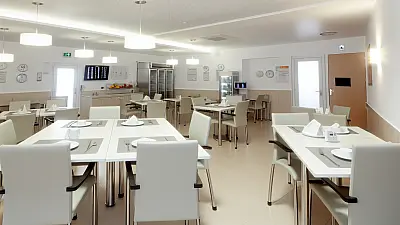EDGERTON, WI - Federal inspectors found that Edgerton Care Center, Inc. failed to immediately report an allegation of abuse involving a resident with dementia and did not adequately protect residents following a concerning incident in November 2024.

Late-Night Incident Raises Serious Safety Questions
The most serious violation identified during the March 31, 2025 inspection centered on events that occurred during the overnight shift on November 28, 2024. A resident with moderate cognitive impairment, identified as R46, was discovered with fresh blood on his right forearm around 1:45-2:00 AM. The 73-year-old resident, who had dementia and required extensive assistance with daily activities, called for help, prompting staff to find him bleeding.
According to documentation reviewed by inspectors, three staff members were working the overnight shift: one regular certified nursing assistant (CNA H), an agency-employed CNA (CNA F), and an agency-employed licensed practical nurse (LPN G). The incident report indicates that after CNA H found the bleeding resident, other staff members were asked to leave the room at the resident's request.
The resident's care plan specifically noted his history of combative behavior and resistance to care, documenting that he could become "verbally/physically aggressive towards staff." Medical records showed R46 had been diagnosed with dementia, generalized anxiety disorder, major depressive disorder, and had a history of hallucinations.
Critical Communication Failures in Emergency Response
The facility's response to this incident revealed significant gaps in their emergency reporting protocols. CNA H left a voicemail message for the Nursing Home Administrator (NHA A) at 1:54 AM but did not continue attempting to reach management. The administrator only learned of the incident hours later when the Director of Nursing called during shift change.
When questioned by inspectors, the administrator stated that staff should "immediately call" management when residents report abuse and there are visible injuries. She emphasized that staff must continue calling until they reach either the administrator or director of nursing, rather than simply leaving a voicemail message.
This communication delay represents a serious breach of resident protection protocols. When residents with cognitive impairment report concerning incidents accompanied by unexplained injuries, immediate management notification is essential for conducting proper investigations and ensuring resident safety.
Medical Risks Associated with Delayed Response
The failure to immediately investigate and report this incident poses significant medical and safety risks for nursing home residents. Individuals with dementia are particularly vulnerable because their cognitive impairment may make it difficult for them to accurately report incidents or protect themselves from potential harm.
Unexplained bleeding in residents with cognitive impairment requires immediate medical assessment to determine the cause and ensure proper wound care. Delayed response can lead to infection, inadequate pain management, and increased risk of additional incidents if safety issues are not promptly addressed.
The resident's documented history of combative behavior and resistance to care made proper incident investigation even more critical. Research shows that residents with behavioral symptoms related to dementia require specialized care approaches and continuous monitoring to prevent escalation of situations that could result in injury.
Industry Standards for Incident Reporting
Federal nursing home regulations require facilities to have comprehensive policies for reporting and investigating any allegations of abuse, neglect, or unexplained injuries. These standards exist because vulnerable residents depend on facility staff to protect their safety and well-being around the clock.
Best practices in nursing home care mandate that when residents report concerning incidents or staff discover unexplained injuries, immediate steps must include: securing the resident's safety, providing necessary medical care, notifying facility administration without delay, documenting all observations thoroughly, and initiating appropriate investigations.
The overnight shift presents particular challenges for nursing home safety, as fewer staff members are typically on duty and management may not be immediately available. However, this makes having clear, well-practiced emergency communication protocols even more essential.
Staff Training and Resident Protection Measures
The inspection findings indicate that the facility failed to immediately educate staff about proper reporting procedures following this incident. This represents a missed opportunity to prevent similar communication failures and ensure all employees understand their responsibilities for resident protection.
Nursing homes are required to train staff on recognizing signs of potential abuse or neglect and understanding their legal and ethical obligations to report concerns immediately. This training must be ongoing and reinforced when incidents occur that reveal gaps in staff knowledge or compliance.
The facility's care plan for R46 acknowledged his tendency toward combative behavior and included approaches for managing resistance to care. However, the incident suggests that additional training may have been needed regarding appropriate techniques for caring for residents with behavioral symptoms and proper documentation of any physical interventions.
Additional Issues Identified
The inspection also revealed that the facility needed to provide additional education to staff regarding the use of physical restraints, specifically addressing situations involving "physically holding a resident's hands down." This finding suggests potential concerns about staff understanding of when and how physical interventions might be appropriately used with residents who exhibit resistance to care.
The inspection documented that R46 had been a long-term resident since October 2021 and had since passed away in December 2024. His complex medical history, including cerebral infarction and cognitive communication deficits, required specialized care approaches that the facility's policies should have addressed more comprehensively.
The violations identified at Edgerton Care Center represent serious gaps in resident protection protocols that could potentially affect other vulnerable residents in the facility. The Centers for Medicare & Medicaid Services classified these findings as causing "minimal harm or potential for actual harm" affecting "some" residents, but the underlying communication and safety issues have broader implications for facility operations.
Full Inspection Report
The details above represent a summary of key findings. View the complete inspection report for Edgerton Care Center, Inc from 2025-03-31 including all violations, facility responses, and corrective action plans.
💬 Join the Discussion
Comments are moderated. Please keep discussions respectful and relevant to nursing home care quality.